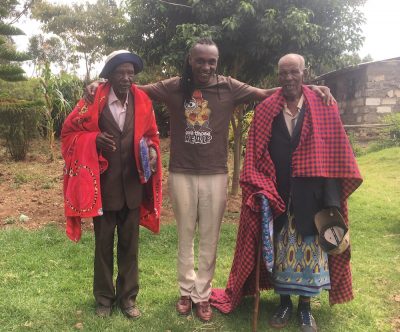
Photo provided by Moffat Kihoro (center).
In 2019 as part of a social media campaign to celebrate linguistic diversity online [1], African language activists and advocates will be taking turns managing the @DigiAfricanLang [2] Twitter account to share their experiences with the revitalization and promotion of African languages. This profile post is about Moffat Kihoro (@yiakupeople [3]) and what he plans to discuss during his week as host.
Rising Voices: Please tell us about yourself.
I am from the indigenous Yiaku community and a projects person at Yiaku Laikipiak Trust [4] (YLT) which is a community based organization that fights for the rights of the almost extinct tribe of Yiaku which dwells in the Mukogodo Forest of Laikipia County, Kenya.
Since its inception, YLT has been trying to preserve the language, culture, and habitat of the tribe which over time has extensively been assimilated to the Maasai community of the region (Laikipia North Constituency, Laikipia County). I thrive to apply acquired skills, knowledge, and experience to develop strategies for gender mainstreaming, minority and special groups rights; equity and equality for all individuals and groups in society and involvement of all in decision making and resource management.
RV: What is the current status of your language on the internet and offline?
The Yiakunte dialect is listed in the UNESCO Red book of endangered languages as on the brink of extinction. On the ground, there are three surviving accurate speakers of the language all of them elderly above the age of 80. These elders will perish with the language if it is not documented and taught to other generations.
RV: On what topics do you plan to focus during the week that you’ll manage the @DigiAfricanLang Twitter account?
I plan to inform on the rights and privileges belonging to indigenous tribes of the world. Inclusion of these minorities in decision making and resource management is critical to ensure preservation of history and native knowledge. The Yiaku community is seeking to be recognised as a Kenyan tribe, I will use the platform to further this agenda. I will also focus on emerging trends and issues on languages of the world.
RV: What are the main motivations for your digital activism for your language? What are your hopes and dreams for your language?
The fact that there are no Yiakunte speakers in our new generation is more of a crisis than a motivation, I am personally teaching myself the Yiaku language to be able to pass it on to my children. I look forward to having the Yiakunte dialect documented in a Yiaku-Maasai-English dictionary for its preservation. We hope to have the Yiaku tribe recognised as a Kenyan tribe by end of 2020.